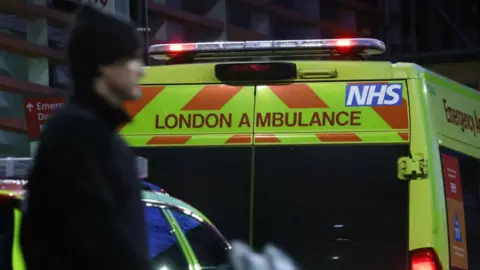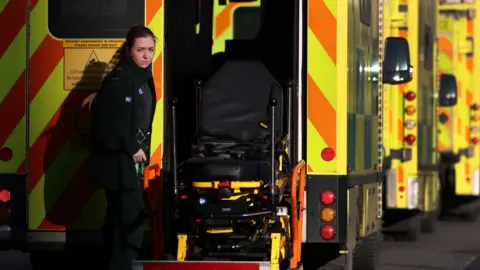Life-threatening 999 calls reach record levels
 Getty Images
Getty ImagesDecember saw the highest number of 999 calls about the most serious, life-threatening conditions than in any other month in London Ambulance Service's (LAS) history, according to new figures.
Data shows about 16,000 category-one calls, which include cardiac arrests and serious injuries, were made.
Several factors contributed to the high emergency call volumes, an LAS spokesperson said, including respiratory and gastrointestinal viruses, cold weather, and festive celebrations.
LAS added although this winter was "extraordinarily challenging", it was doing all it could to care for Londoners.
The service treated more than 500 category-one patients most days in December, compared with about a quarter of days in December 2023, figures show.
Breathing problems were up 30% and cardiac arrests rose by 20% compared with last year.
The figures also show it was the third busiest December and the seventh busiest month overall in the service's history with call volumes reaching 92% of the unprecedented demand seen during the Covid-19 pandemic in March 2020.
The high volume of calls is showing no signs of easing, as demand in the first week of January is 20% higher than in the same week of 2024.
 EPA
EPAAfter describing this winter as "extraordinarily challenging", LAS chief executive Daniel Elkeles said: "I want to assure the public that despite significant increases in demand to levels last seen during the pandemic, we are doing all we can to care for London."
He said LAS had increased staff in ambulances, control rooms, and cars, and had treated more patients over the phone.
Staff had also worked with 28 London emergency departments to take patients to the hospitals with the shortest wait times.
"Despite these improvements, we know our response times are not good enough and are very sorry some people waited too long for us to get to them," he added.
He said work would continue to deliver the "best possible care" to patients over the winter.
The LAS said it had implemented a Winter Plan to cope with the exceptional demand, which included:
- Increasing the number of ambulances and staff by more than 10%
- Deploying up to 60 additional ambulances during peak times
- Increasing the number of clinicians available for telephone triage
- Expanding the use of alternative care options
- Enhancing coordination with hospitals and partners
An LAS spokesperson said health authorities were urging Londoners to use the 999 service wisely, reserving it for serious medical emergencies.
For urgent but less serious medical needs, people have been advised to consider alternatives such as GPs, pharmacies and utilise NHS 111 online or by phone.
Listen to the best of BBC Radio London on Sounds and follow BBC London on Facebook, X and Instagram. Send your story ideas to [email protected]
